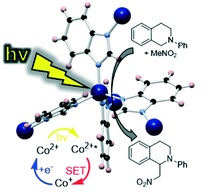Research
Design of Heterogenous Organocatalysts (Collaboration with Professor Raja’s research group)
One of the major drawbacks in homogeneous organocatalysis is the use of sub-stoichiometric quantities of the organocatalyst (20 mol%). This huge amount of catalyst presents several disadvantages, such as purification steps to remove the catalyst, which make the process more expensive, if the catalyst cannot be suitably recovered. One of the possible avenues to solve this problem from an environmental and economic perspective, and to facilitate the industrial implementation of organocatalysis, is to anchor the homogeneous organocatalyst within in a porous solid support. Our group in collaboration with Dr. Raja’s group (a world leader in heterogeneous catalysis) have designed and developed a new series of supported organocatalysts that offer an effective and attractive alternative compared to homogenous organocatalysts. As part of this collaboration, we anchored organo Lewis-base catalysts, such DABCO, within the inner walls of a mesoporous silica support (figure 1). We have highlighted the efficacy of our design rationale and its amenability for tailoring the nature of the active site, via meticulous choice of pore-aperture and hydrophobicity, to create a superior heterogenised analogue for Michael addition and Baylis Hillman reactions. It is envisaged that this immobilisation strategy could be rationally extended to the heterogenisation of a plethora of organocatalysts.

Figure 1: Supported DABCO
Very recently we developed a Cobalt-containing zeolitic imidazole frameworks for C–H activation using visible-light redox photocatalysis:

Figure 2 : Supported photocatalytic reaction
Related Publications:
1- -“Cobalt-containing zeolitic imidazole frameworks for C–H activation using visible-light redox photocatalysis” Matthew E. Potter, Cameron P. Ross, Diego Gianolio, Ramon Rios and Robert Raja, Catal. Sci. Technol. 2020, 10, 7262-7269.
2- “Hybrid catalysts based on N-heterocyclic carbene anchored on hierarchical zeolites” Enrica Gianotti, Ivana Miletto, Chiara Ivaldi, Geo Paul, Leonardo Marchese, Marta Meazza, Ramon Rios and Robert Raja RSC Adv. 2019, 9, 35336-35344.
3- “Acid Properties of Organosiliceous Hybrid Materials Based on Pendant (Fluoro)Aryl-Sulfonic Groups through Spectroscopic Study with Probe Molecules” Andrea Erigoni, Geo Paul, Marta Meazza, María Consuelo Hernández-Soto, Ivana Miletto, Ramon Rios, Candela Segarra, Leonardo Marchese, Robert Raja, Fernando Rey, Enrica Gianotti and Urbano Díaz Cat. Sci. Tech. 2019, 9, 6308-6317.
4- “Highly effective design strategy for the heterogenisation of chemo- and enantioselective organocatalysts” Stephanie Newland, David Xuereb, Enrica Gianotti, Leonardo Marchese Ramon Rios, Robert Raja* Cat. Sci. Tech. 2014, DOI: 10.1039/C4CY00895B

